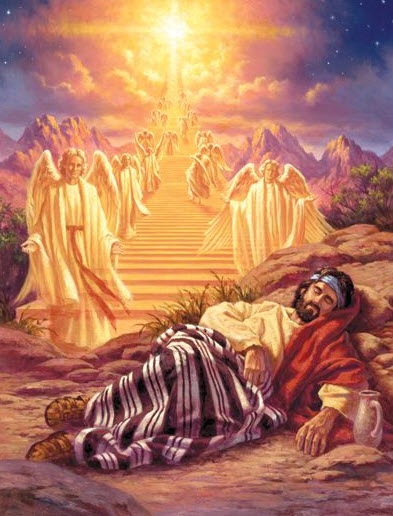Over the past three weeks, the Book of Genesis has featured prominently in the daily liturgy, speaking to us especially of the great Patriarchs, Abraham, Isaac, and Jacob, as well as their wives, not to mention a host of secondary characters who still play important roles in the developing story. And it is the story of creative beginnings and saving interventions on the part of God. For this is the beginning of the People of Israel, the Chosen Nation, consisting paradoxically of heroic, yet frail, people.
If we use our imagination to focus on certain images in these texts we can learn valuable lessons about the way in which God interacts with His creation.
Take, for example, the tale of Jacob, grandson of Abraham and son of Isaac. He is the crafty trickster who cheats his brother Esau out of his inheritance by impersonating him before the blind old man. He has to get out of town in a hurry to escape his brother’s wrath and finds his way to the land of Haran, to the home of his uncle Laban, where his parents hope he will find a wife among his cousins.

On the way, he falls into a deep sleep and dreams of a ladder joining heaven and earth, with angels travelling up and down (Gen. 28:10-22). Then God speaks to him, assuring him that he is blest and chosen, followed by a promise to keep him safe. Jacob’s ladder is a comforting, yet challenging image of the close and intimate encounter between heaven and earth, God, and Creation.
Indeed, in this first book of the Bible, God is portrayed as immanent, so close to humans in particular. So he walks in the cool of evening with Adam and Eve in the Garden of Eden. His frequent appearance to Abraham is not accompanied by any razzmatazz, such as we find in the Book of Exodus in the episode of the burning bush where Moses must go shoeless on holy ground!
When it comes to God’s decision to punish Sodom and Gomorrah, Abraham has no problem bargaining with the Lord in trying to save the cities by the discovery of even a small set of just men (Gen 18:16-33)! This provides us with an interesting view of prayer of petition, which is strung between familiarity and reverence.
Pondering on this ladder image we might build on it, suggesting that there may be many such ladders linking God and Creation, many of them planted in the human soul. God’s angels are still ascending and descending, as are the saints carrying our prayers. And most significant of all, may we not see our Christian life, our spiritual life, as a somewhat arduous climb to our heavenly, divine destiny, with the Lord urging us on, or better still, getting behind us to give us that much needed push!
The great English poet, Francis Thompson, evokes the ladder image in his splendid poem, In No Strange Land:
O World invisible, we view thee,
O World intangible, we touch thee,
O World unknowable, we know thee,
Inapprehensible, we clutch thee!
The angels keep their ancient places; –
Turn but a stone and start a wing!
‘Tis ye, ‘tis your estranged faces,
That miss the many splendour’d thing.
But (when so sad thou canst not sadder)
Cry; – and upon thy so sore loss
shall shine the traffic of Jacob’s ladder
pitched between Heaven and Charing Cross.
The Patriarch Jacob was tested by God to make him trustworthy, suffering so much along the way, especially the loss of his favourite son, Joseph, trafficked by his brothers to Egypt. But he remained firm and staunch, as we must be too, for we believe as he did, that the really important traffic is not the type we experience on our roads, so often in gridlock, bumper to bumper, but the traffic of holy ones up and down that true ladder, pre-eminently Jesus, the Son of Man, who is that ladder to heaven for all!
“Climb, for all your worth!”
Kieran Cronin OFM
